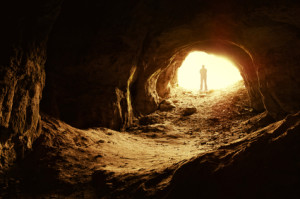Another Bozo on the Bus
“For there is no distinction: for all have sinned and fall short of the glory of God” (Romans 3:22-23a). The main thing alcoholics have in common is they all drink to get drunk. Just as there is nothing to serve as a possible ground for someone being a ‘lesser’ or ‘worse’ sinner before God, in Twelve Step recovery there are no differences among alcoholics or addicts, since all are powerless over alcohol. In “Just Another Bozo on the Bus,” an anonymous AA said in his Grapevine article that the story of his sobriety was one of a growing realization of all the ways he was exactly like others in Alcoholics Anonymous. “That experience of being ‘the same as,’ of being ‘one among many,’ of being ‘just another bozo on the bus’ is critical to the maintenance of my spiritual condition.”
This sense of ‘no distinction’ lies at the heart of Twelve Step recovery: “We are either all alcoholics with no distinction (and therein lies our power) or we might as well shut up shop.” It is truly is a matter of life and death: “There are no distinctions made for color, race, economic status, or education. We are all equal and have to reach out to one another in order to survive.” Felicia G. recalled how two women first talked to her about what she would find in AA: “It is a pattern and you are not alone. You are not the only woman who has been like this. Thousands and thousands of men and women have been like this. And now they are sober.” An anonymous twenty-year old AA put it this way:
To me, God is an artist and he sculpts people into what they really are. He accomplishes this through the Twelve Steps. I can see he has done this, and is still doing this, with my friends and me. Although we are all sculpted differently, there is a certain fact that holds us all together. That fact is alcoholism. I have heard it referred to as the “great equalizer.” Now AA is the great equalizer in my life because no matter what people have done, thought, or felt, if they are alcoholics, we have a common bond.
The self-same sense of oneness exists within Narcotics Anonymous (NA). Like “a lifeboat in a sea of isolation,” NA is: “a fellowship of people with a common bond of recovery.” They all have one thing in common: “All of us, from the junkie snatching purses to the sweet old lady hitting two or three doctors for legal prescriptions, have one thing in common: we seek our destruction a bag at a time, a few pills at a time, or a bottle at a time until we die.” The common problem was addiction and no one was greater (or less) than any one else: “No member is greater or lesser than any other member.” Herein lies its power: “We found that no matter what our past thoughts or actions were, others had felt and done the same. Surrounded by fellow addicts, we realized that we were not alone anymore.”
This common bond—whether it is sin or addiction/alcoholism—this great equalizer cuts across all peoples. We do not understand our actions. We do the very thing we hate. We have the desire to do what is right, but not the ability to carry it out. “For I do not do the good I want, but the evil I do not want is what I keep on doing” (Romans 7:15-20). We are powerless; we are sinful.
There are no social or cultural distinctions made by God with regards to the universal sinfulness of all people; regardless of their particular sin, they all fall short. “There will be tribulation and distress for every human being who does evil, the Jew first and also the Greek” (Romans 2:9). Here, and other places in Scripture ‘Greek’ can be an equivalent for those who are non-Jews or ‘Gentiles.’ Everyone who sins, Jew or non-Jew (Greek or Gentile), faces tribulation and distress.
In the Sermon on the Mount, Jesus addressed the human tendency to deny or minimize personal sinfulness when He said that whoever relaxed one of the least of the commandments and taught others to do so, would be least in the kingdom of heaven (Matt. 5:19). Anger has the same liability for judgment before God as murder; a man who looks lustfully at a woman has already committed adultery in his heart (Matthew 5:21-30). Paul clearly had this sense in mind when he said that the “dividing wall of hostility” has been broken down in Christ (Ephesians 2:14). But we need some context to fully understand the significance of Paul’s statement here.
Paul traveled to Jerusalem and was counseled by James and others to demonstrate his obedience to Jewish religious law by purifying himself in the temple. Jews from the province of Asia had spread the rumor that Paul taught Jews living among the Gentiles to forsake Moses by not circumcising their children; to stop keeping Jewish religious customs (Acts 21:21). The Christian leaders wanted Paul to demonstrate this was not true; that he even continued to follow Jewish religious law himself. Some Ephesian Jews saw Paul in the temple as he completed this rite of purification and assumed he had dared to bring an Ephesian Gentile named Trophimus into the temple with him. They raised an alarm, seized Paul and beat him (Acts 21:27–32).
The inner court area of the temple in Jerusalem was raised slightly above the outer court of the Gentiles and surrounded by a barrier. Notices in Greek and Latin warned that no responsibility would be taken for the probable death of any Gentile who ventured within. According to The IVP Background Commentary: New Testament, taking a Gentile beyond the dividing wall of the outer court in the temple was considered to be such a serious breach of Jewish law that the Romans permitted Jewish leaders to execute those who violated this law. The Ephesian Jews accused Paul of violating this law.
Paul was imprisoned and later transferred to Caesarea when a plot to assassinate him was discovered. He remained in prison there for two years. Eventually he appeared before the newly appointed governor, Festus. Another plot to ambush and kill Paul during his transport back to Jerusalem to stand trial before Festus was thwarted by Paul’s appeal to Caesar.
Paul said he had done nothing wrong against the law of the Jews, the temple, or against Caesar. He was willing to die if found guilty of anything deserving death but rejected Festus’s request to return to Jerusalem for trial. Since the charges against him were not true (the Jews could not prove any of their charges), Paul said no one had the right to hand him over to the Jews, so he appealed his case to Caesar (Acts 23:20-33; 25:1-12). Paul was transferred to Rome, where he wrote the epistle to the Ephesians from prison. This set of circumstances has a somewhat poetic circle to it: the riot in Ephesus; the Ephesian Jews accusing him in Jerusalem; Paul’s appeal to Caesar; and then his writing the epistle to the Ephesians from Rome.
The believers in Ephesus would have been aware of the circumstances of Paul’s arrest and imprisonment. So his statement in Ephesians 2:14 about Christ breaking down the dividing wall between Jews and Gentiles had a special meaning to them, since a dispute over Paul violating the dividing wall in the temple was what had precipitated his arrest. Originally separated from Christ and strangers to the covenant of promise, Gentile believers have been brought near by the blood of Christ. Breaking down the dividing wall of hostility in his flesh, Christ has created in himself one new man, reconciling both Jew and Gentile in one body through the cross (Ephesians 2:11-16). So the divisions between Jew and Gentile, the circumcision and uncircumcision are no longer valid in the body of Christ. The dividing wall of hostility has been destroyed.
If somewhere within human diversity, there is a people group whose sinfulness is less than (or more than) others, there cannot be a universal need for salvation in Christ. Charles Hodge said that the universal nature of sin is “one of the most undeniable doctrines of Scripture, and one of the most certain facts of experience.” Until this fact is admitted, there is no place or need for the Gospel. Everyone who calls upon the name of the Lord, whether they are Jews or Greeks (non-Jews), will be saved (Romans 10:12-13). “There is neither Jew nor Greek, there is neither slave nor free, there is no male and female, for you are all one in Christ Jesus” (Galatians 3:28). “Here there is not Greek and Jew, circumcised and uncircumcised, barbarian, Scythian, slave free; but Christ is all, and in all” (Colossians 3:11). “For God shows no partiality” (Romans 2:11). And I am just another bozo on the bus.
If you’re interested, more articles from this series can be found under the link for “The Romans Road of Recovery.” “A Common Spiritual Path” (01) and “The Romans Road of Recovery” (02) will introduce this series of articles. If you began by reading one that came from the middle or the end of the series, try reading them before reading others. Follow the numerical listing of the articles (i.e., 01, 02, etc.), if you want to read them in the order they were originally intended. This article is the 8th in the series. Enjoy.









